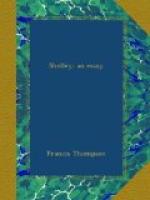Sings as if the god of wine
Had helped him to a valentine.
Wordsworth’s is the
—Love with quiet blending,
Slow to begin and never ending,
the “serious faith and inward glee.”
But if Shelley, instead of culling Nature, crossed with its pollen the blossoms of his own soul, that Babylonian garden is his marvellous and best apology. For astounding figurative opulence he yields only to Shakespeare, and even to Shakespeare not in absolute fecundity but in images. The sources of his figurative wealth are specialised, sources of Shakespeare’s are universal. It would have been as conscious an effort for him to speak without figure as it is for most men to speak with figure. Suspended in the dripping well of his imagination the commonest object becomes encrusted with imagery. Herein again he deviates from the true Nature poet, the normal Wordsworth type of Nature poet: imagery was to him not a mere means of expression, not even a mere means of adornment; it was a delight for its own sake.
And herein we find the trail by which we would classify him. He belongs to a school of which not impossibly he may hardly have read a line—the Metaphysical School. To a large extent he is what the Metaphysical School should have been. That school was a certain kind of poetry trying for a range. Shelley is the range found. Crashaw and Shelley sprang from the same seed; but in the one case the seed was choked with thorns, in the other case it fell on good ground. The Metaphysical School was in its direct results an abortive movement, though indirectly much came of it—for Dryden came of it. Dryden, to a greater extent than is (we imagine) generally perceived, was Cowley systematised; and Cowley, who sank into the arms of Dryden, rose from the lap of Donne.
But the movement was so abortive that few will thank us for connecting with it the name of Shelley. This is because to most people the Metaphysical School means Donne, whereas it ought to mean Crashaw. We judge the direction of a development by its highest form, though that form may have been produced but once, and produced imperfectly. Now the highest product of the Metaphysical School was Crashaw, and Crashaw was a Shelley manque; he never reached the Promised Land, but he had fervid visions of it. The Metaphysical School, like Shelley, loved imagery for its own sake: and how beautiful a thing the frank toying with imagery may be, let The Skylark




